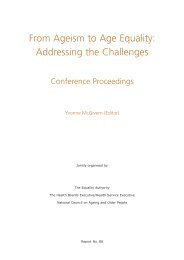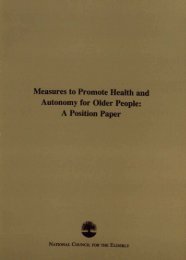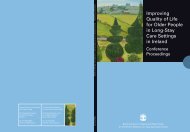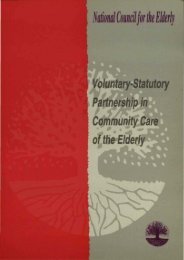Improving Quality of Life for Older People in Long-Stay Care ...
Improving Quality of Life for Older People in Long-Stay Care ...
Improving Quality of Life for Older People in Long-Stay Care ...
- No tags were found...
Create successful ePaper yourself
Turn your PDF publications into a flip-book with our unique Google optimized e-Paper software.
5.6.2 Social EnvironmentParticipants considered it important that residents had opportunities to participate <strong>in</strong>recreational activities. They highlighted the importance <strong>of</strong> planned provision, varietyand a choice as to whether to participate or not. Participants suggested that recreationalactivities were an important <strong>in</strong>dicator <strong>of</strong> the quality <strong>of</strong> the social environment.However, participants reported that it was very hard to meet everybody’s needs,particularly <strong>in</strong> the larger facilities. Despite recognis<strong>in</strong>g its importance, participantsfound f<strong>in</strong>anc<strong>in</strong>g activities and trips problematic as it was not budgeted <strong>for</strong>.Activities: comments from focus group participantsWell, I th<strong>in</strong>k it’s very important (hav<strong>in</strong>g activities), it keeps them very motivated –activity, and it keeps their m<strong>in</strong>dset from becom<strong>in</strong>g very … look<strong>in</strong>g <strong>in</strong>wards. And theylove activity, and they … it cheers them up a lot, I f<strong>in</strong>d. (FG2G)And I th<strong>in</strong>k a lot <strong>of</strong> residents probably would f<strong>in</strong>d that (boredom is) a problem <strong>in</strong>itiallywhen they go <strong>in</strong>to long-term care, and then they get so used to the fact that there isnoth<strong>in</strong>g happen<strong>in</strong>g and they sit there all day. I th<strong>in</strong>k that needs to be addressed. (FG1G)Activities, they should be led by the residents really, by their needs, or requirements.(FG2D)They all have their own personality and they have different expectations, and youknow, the one that will play a game <strong>of</strong> cards, the other one never played cards <strong>in</strong>their life, and won’t do it. It’s difficult try<strong>in</strong>g to cater <strong>for</strong> everybody. (FG1G)It’s very difficult to achieve <strong>in</strong> a residential sett<strong>in</strong>g, and you don’t have a budget<strong>for</strong> it either, which is a problem. (FG1D)1055.6.3 Keep<strong>in</strong>g <strong>in</strong> Touch with Their CommunityParticipants considered it important that older people ma<strong>in</strong>ta<strong>in</strong>ed contact with theircommunity and equally that people from the community were <strong>in</strong>volved <strong>in</strong> some <strong>of</strong>the activities <strong>in</strong> the facility. They believed that it was particularly important that theolder person was placed somewhere near their home if they were to reta<strong>in</strong> l<strong>in</strong>kswith their community. Participants also highlighted the importance <strong>of</strong> volunteersalthough they made no reference as to whether volunteers should come from youngeror older age groups. They were somebody different, somebody residents couldchat to and helped to reta<strong>in</strong> a l<strong>in</strong>k with the community. Some participants reportedthat it was difficult to recruit volunteers and that there were issues over <strong>in</strong>suranceunder the present Cl<strong>in</strong>ical Indemnity Scheme (CIS). A further suggestion was thatconsideration should be given to <strong>in</strong>tegrat<strong>in</strong>g day care centres <strong>in</strong>to long-stay facilitiesas this would <strong>in</strong>crease the potential <strong>of</strong> residents to reta<strong>in</strong> their local l<strong>in</strong>ks.















